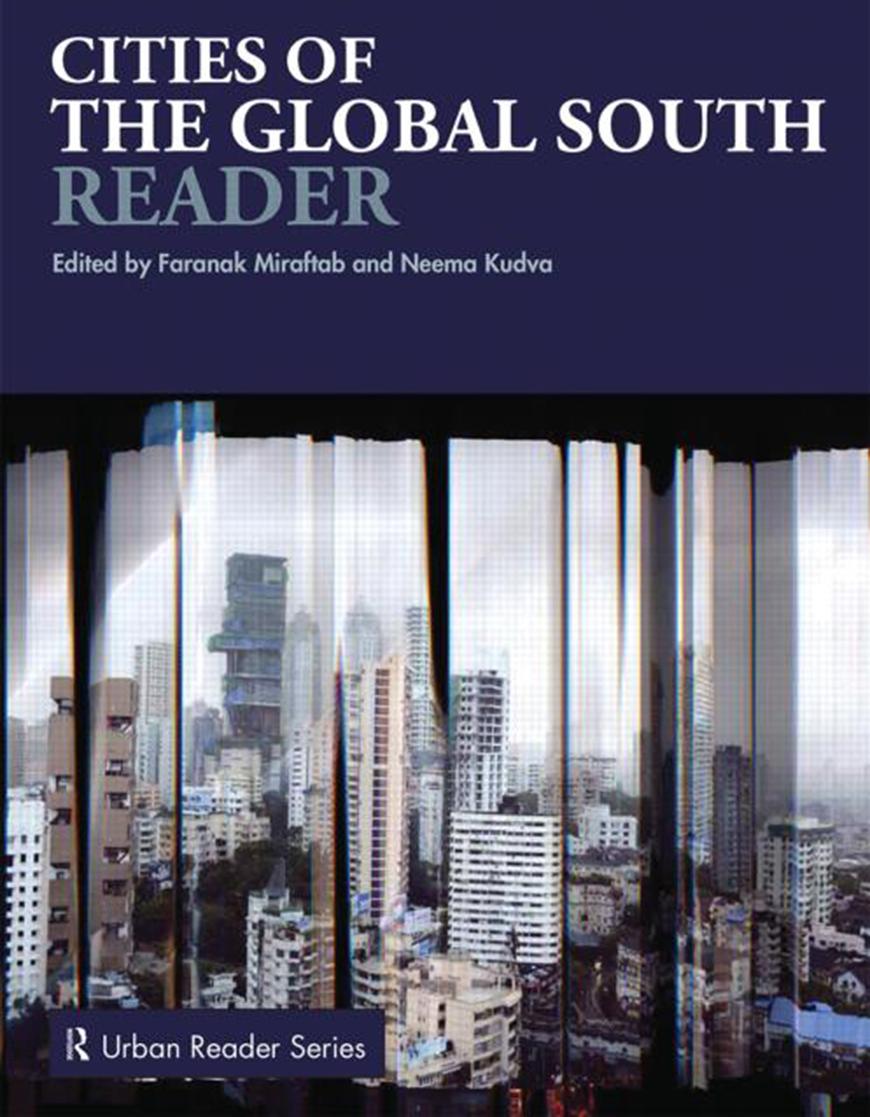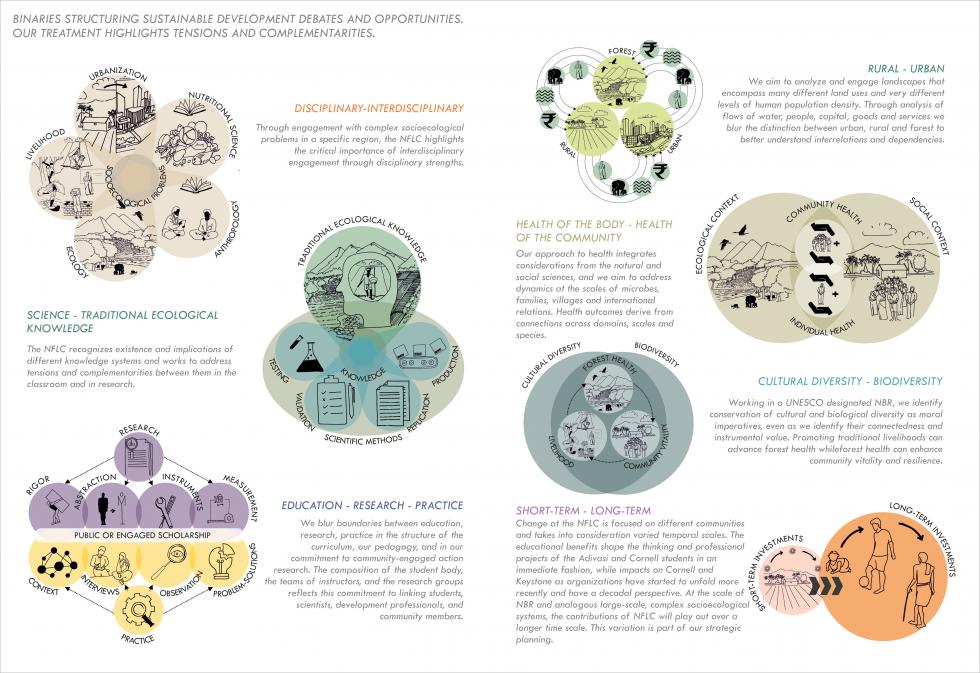Neema Kudva
Neema Kudva's research focuses on small cities and their regions and on institutional structures for equitable planning and development. She has explored various aspects of these issues, primarily in South Asia but also in the U.S. and across the world, with students. She is involved in pedagogical experiments around citizenship and sustainability planning and is faculty lead for the Nilgiris Field Learning Center, Kotagiri, a transdisciplinary engaged collaboration between Cornell and the Keystone Foundation, India.
At Cornell, Kudva is the senior associate dean for academic affairs; house professor and dean at Becker House, a living-learning residential community; and co-chair of the AAP Council for Diversity & Inclusion. She serves as a faculty affiliate of the South Asia Program, a fellow of the Atkinson Center for a Sustainable Future, and a field member for public affairs, Asian studies, development sociology, and visual studies. Prior to joining Cornell in 2001, Kudva worked as a consultant to public planning agencies in the San Francisco Bay area, as well as as an architect in India and Europe.
Kudva received her Dip.Arch. from the School of Architecture CEPT at Ahmedabad, India, in 1989; and her M.Arch./M.C.P. and Ph.D. from the University of California–Berkeley in 2001.
"I am interested in practices and institutions that undergird equitable planning. I look for organizing principles in the everyday and in the exceptional, which help generate resistance as well as equitable, beautiful, and just ways of being."
Academic Research/Specialty Areas
- Community-based planning and development
- Housing
- Infrastructure planning
- International studies in planning
- NGOs
- Participatory and collaborative planning
- Social policy
- Sustainability
- Mobility
Related Links
- Nilgiris Field Learning Center
- South Asia Program, Mario Einaudi Center for International Studies
- Carl Becker House, West Campus Housing System
Related News
- Virtual CRP Graduate Open House for Admitted Students, Spring 2025
- Cornell Adds Three A.D. White Professors to Celebrated Roster
- Virtual CRP Graduate Open House for Admitted Students, Spring 2024
- City and Regional Planning Virtual Graduate Information Session
- Bangladesh's Water Crisis and the Problem of a "Green" Solution
Classes (Selected)
- CRP 5190 Urban TheoryWe live in an urban majority world, with diverse patterns of urbanization and types of urban places. Cities are not just nodes on transaction networks, or physical collections of build form specific to a context and global movements, or diverse places that represent a mix of cultures over time. They are political assemblages in which formal and informal institutions of governance are forged and continue to be shaped as policies change and morph over time. Various processes impacting societies shape the cities where we live, work, and play: ranging from climate change, shifting migration patterns, and large-scale population movements to changes in geo-political power and the technologies of infrastructure, communication, and manufacturing. But what constitutes the city? What concepts allow us to understand how cities grow, shrink, or expand, and shivel or thrive? This course seeks to introduce you to the broad contours of an interdisciplinary body of work that aims to theorize the city. Using a format of readings, lectures, and discussions, we seek to become familiar with core perspectives of well-established traditions in urban theory that emerges from perspectives on city economy, spatial development, environment, infrastructure, social life, cultural experience, urban politics, and interventions.
- CRP 6740 Urban Transformations in the Global SouthWe live in the age of the city. At some point early in the twenty-first century, the majority of the world's population became urban and the bulk of all growth in the future is expected to occur in the global South - a vast geographical and conceptual space where some of the world's most ancient cities continue to thrive. This graduate seminar seeks to you to a body of work on the cities of the global South, their diversity, growth and change starting in the early twentieth century. Drawing on a large interdisciplinary literature, we will consider the different ways in which scholars and researchers have sought to conceptualize and understand processes of city-building in the global South.
- CRP 6150 Current Debates on NGOsThis seminar examines a range of topics that are key to understanding nongovernmental (NGO) and private sector, nonprofit organization's actions and outcomes: their effectiveness at service provision and advocacy; their political role in constructing social capital and strengthening civil society; their relationship with the state and donor agencies; and issues related to organizational design for success. The intention is to gain a broad-based understanding of NGO actors, both as they stand today and in their development over the past four decades. The emphasis throughout will be to critically evaluate the literature, research, and accounts on NGOs as both institutional actors in the development arena and as bounded organizations at the local level: a task that is complicated by the heterogeneity of contexts and organizational types.
- CRP 3850 Planning and Sustainability, the Case of the Nilgiris Biosphere (NFLC, Kotagiri, India)
Awards, Grants, and Fellowships (Selected)
- Senior long term research fellow, American Institute of Indian Studies (AIIS), Chicago and Delhi (spring and summer 2017)
- Kendall S. Carpenter Memorial Advising Award, Cornell University (2015)
- "Stories of Solidarity: Experiencing COVID in the Global South" Engaged Opportunity Grant (2020)
- "Continuing Curricular Development for Engaged Research and Learning at the Nilgiris Field Learning Center in Ithaca, NY, and Kotagiri, Tamil Nadu, India" Engaged Curriculum Development Grant with Steven Wolf, Andrew Willford and Lucinda Ramberg (Cornell), Carol Babiracki, and Emera Bridger (Syracuse), Pratim Roy, Anita Varghese, and Jyotsna Krishnakumar (Keystone Foundation, India) (2019)
- "Stories of Solidarity: experiencing COVID in the global South" Engaged Opportunity Grant (2020)
- "Continuing Curricular Development for Engaged Research and Learning at the Nilgiris Field Learning Center in Ithaca, NY and Kotagiri, Tamil Nadu, India" Engaged Curriculum Developement Grant with Steven Wolf, Andrew Willford, and Lucinda Ramberg (Cornell), Carol Babiracki and Emera Bridger (Syracuse), Pratim Roy, Anita Varghese and Jyotsna Krishnakumar (Keystone Foundation, India( (2019)
- "Ecological Learning Collaboratory for Food, Healing, and Spatial Justice," workshop with Stacey Langwick, anthropology; and Rachel Bezner-Kerr, development sociology. Support from the Mario Einaudi Center for International Studies, Engaged Cornell, and Small Grants Fund at the Institute for Social Sciences at Cornell (2018)
- "Urban South Asia Writ Small," an interdisciplinary conference (with Dan Gold, Asian studies, Cornell University; Ann Gold, anthropology, Syracuse University; and Carol Babiracki, art and music histories, Syracuse University). Support from the NRC Syracuse-Cornell South Asia Consortium funded by U.S. Department of State, Mario Einaudi Center for International Studies, and CRP (2018)
Exhibitions and Presentations (Selected)
- "Thinking Tech: in, of, and for planners and citymakers" Conference on Critical Technologies: Urban Tech for Social Impact" Jacobs Institute at Cornell Tech, and Technion, Israel Institute of Technology, Faculty for Architecture and Town Planning (Virtual, June 2021)
- "Full Circle" Final and tenth webinar in the series, … and injustice for all. West Campus House System. eCornell Keynotes (May 2021) https://ecornell.cornell.edu/keynotes/view/K051221a/
- "Facing the Frontier in a Year of Pandemic and Protest." Conference on Planning Futures? On Decolonial, Postcolonial and Abolitionist Planning Conference, Columbia University (Virtual, March 2021)
- "Our Cities, Our Selves, Our Institutions: Planning During COVID." 5th Annual Research on Cities Summit ACRCS 5.0. School of Human Settlements, Xavier University, Bhubaneswar, Odisha, India. (Virtual, February 2021)
- "Crossing boundaries everyday: one pedagogical exercise at the Nilgiris Field Learning Center." Paper presented at the Association of Collegiate Schools of Planning Annual Conference (Virtual, November 2020)
Publications (Selected)
- Nidhi Subramanyam and Neema Kudva. 2020, "Acquiescence in the face of dispossession: The case of Mahindra World City Economic Zone, Tamil Nadu, India" Environment and Planning C: Politics and Space.
- Faranak Miraftab and Neema Kudva. Cities of the Global South Reader. London and New York: Routledge, 2015.
- Steven Wolf, Neema Kudva, Anita Varghese, Andrew Willford, Snehlata Nath, Pratim Roy, and Rebecca Stoltzfus. "Slow conservation in the Nilgiris Field Learning Center: an integrative model of education, research, and practice." Current Conservation 12, no. 4, 2018.
- Neema Kudva. "The Future City: Critical Interventions for Equity, Debate 3." In Informal Urbanisms: Emergent Approaches to Urban Transformation, ed. Kyle Farrell, from "Debates on Urbanism," series ed. Tigran Haas, KTH Royal Institute of Technology, Stockholm. Helsinki: Opus Liberum, 2018.
- Neema Kudva. "Small Cities, Big Issues: Indian Cities in the Debates on Urban Poverty and Inequality." In Cities and Inequalities in a Global and Neoliberal World, eds. Faranak Miraftab, Ken Salo, and David Wilson, London and New York: Routledge, 2015.





